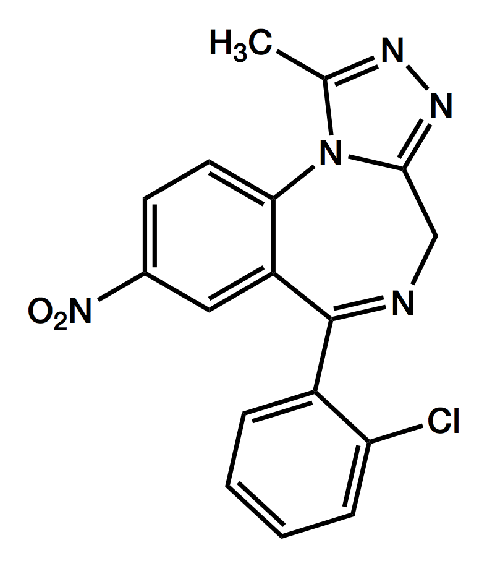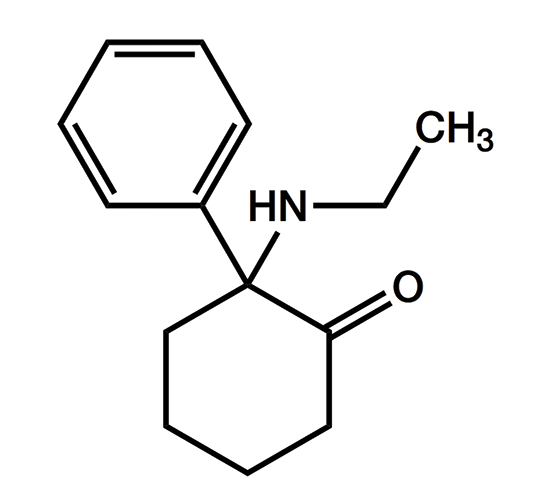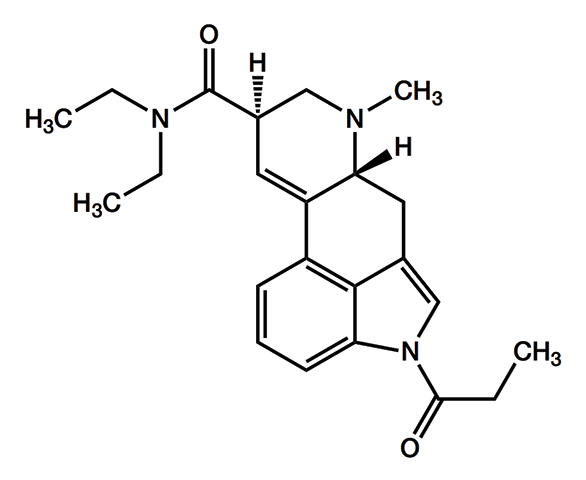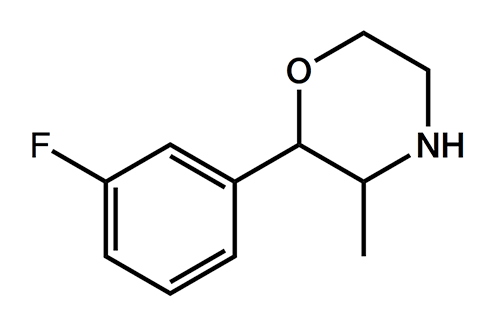Novel Drug Briefs 2
Clonazolam, 2'-Oxo-PCE, 1P-LSD, and 3-FPM
September 2016
Originally published in Erowid Extracts #29
Citation: The Erowid Crew. "Novel Drug Briefs 2: Clonazolam, 2'-Oxo-PCE, 1P-LSD, and 3-FPM". Erowid Extracts. Sep 2016;29:10-11. Online edition: Erowid.org/chemicals/chemicals_article2.shtml
See also: the first installment of Novel Drug Briefs and Recreational Roulette
Erowid monitors and tracks new psychoactive substances (NPS) and novel pharmaceuticals. NPS (also called research chemicals or, improperly, "synthetic drugs") often reach the public long before robust information is available about them.
In both 2014 and 2015, the United Nations Office on Drugs and Crime identified more than a hundred new NPS, not counting approved medications. This growth is due in part to advances in pharmaceutical development techniques, expanded marketplaces for psychoactive drugs, and consumers willing to test NPS on themselves.
The serious legal consequences associated with the classic prohibited drugs can make becoming an NPS guinea pig seem like a rational choice. Some of the brand new drugs are almost certainly useful, fun, and reasonably safe. But it is a long, slow process to determine the risks and benefits for each drug and assess their usefulness as recreational, medicinal, therapeutic, or spiritual tools.
Clonazolam is a potent medium-duration benzodiazepine with effects described as somewhat more euphoric and sedating than many other benzos. It was first synthesized in 1971 and became available through online vendors around August 2015, following on the popularity of etizolam. Its safety profile is not well established, but it seems to be both physically and psychologically addictive with tolerance potentially building more rapidly than other drugs in its class. There are reports of pronounced withdrawal symptoms after only three days of consecutive use.
Upon becoming widely available, some dosage guidelines identified a "common" dose at 0.5 mg, which is now considered "strong". That may have contributed to some health and addiction issues, since it is often sold in small "pellets" (tablets) containing 0.5 mg. As with any drug that can be purchased as a pure powder and produces strong effects at below 10 mg, the relative ease of an overdose is a concern.
2'-Oxo-PCE (also called O-PCE or 3F-MeO-PCP) is a dissociative in the aryl-cyclohexylamine class, similar to ketamine both structurally and in effects. It first became available through online vendors in mid- to late-2015, following other previously available dissociatives such as methoxetamine (MXE), methoxphenidine (MXP), and deschloroketamine. Common single dosages are approximately 15-30 mg oral, 5-20 mg insufflated.
An Erowid experience report by delightfullydisturb (Exp 108524) describes the experience of an insufflated 5 mg dose (several hours after two 1 mg trials).
1P-LSD is a psychedelic in the lysergamide class. It first emerged in the UK in January 2015, just a week after the previously popular lysergamides LSZ and AL-LAD were scheduled there. 1P-LSD had no mention in scientific literature or history of human use prior to 2015. It has been sold on standard ¼" blotter squares ostensibly containing 100 or 125 µg each. At $7-10 for a single hit or $350 for a sheet of 100 hits, prices are competitive with other research chemical lysergamides and black market LSD.
1P-LSD has a structure similar to that of ALD-52, a lysergamide that may have briefly been available in California during the late 1960s (but which was not Orange Sunshine as is sometimes erroneously claimed). ALD-52 is thought to act as a prodrug for LSD and experimenters believe the same is true of 1P-LSD. The dose, effects, and duration of 1P-LSD are extremely similar to those of LSD and they appear to be nearly indistinguishable when compared in informal blind tests.
In October 2015, Brandt et al. described the presence of LSD when 1P-LSD was incubated in human serum, confirming a decades-old theory that acyl derivatives of LSD are converted to LSD in the body. That same month, after nearly 50 years as an obscure historical footnote, ALD-52 blotter appeared on the research chemical (RC) market.
MrMoran describes his 1P-LSD experience (Exp 106122):
3-FPM is a stimulant first sold publicly in late 2014. It's an analogue of phenmetrazine, which was a popular prescription stimulant and weight-loss drug from the mid-1950s to the 1970s. 3-FPM is the first analogue of phenmetrazine to have been seen on the RC markets.
The addition of fluorine to phenmetrazine does not appear to have altered its character. Experience reports suggest it is a functional stimulant with mild euphoria. Some people describe a "ceiling effect" in which increasing the dose only minimally increases desirable effects. Heavy users also report that protracted, multi-dose sessions can cause concerning negative side effects and markedly extend the time between last dose and sleep.
As with many NPS, the aim of 3-FPM's development as a product seems to have been to avoid legal restrictions, rather than improving on the parent compound. Although its sale for human consumption is outlawed by many analogue acts, it is only specifically named in the laws of a small handful of countries.
Typical single dosages are 30-50 mg oral (a little less if insufflated), making it slightly more potent than phenmetrazine. As with many stimulants, people report experiencing "more-ishness" when using, especially when insufflated. There are many reports of heavy users of stimulants consuming up to a gram in a 24-hour session.
A report submitted by Freddy (Exp 105316) describes an experience with 29 mg of 3-FPM taken orally, followed by an additional 45 mg two hours later.
Erowid monitors and tracks new psychoactive substances (NPS) and novel pharmaceuticals. NPS (also called research chemicals or, improperly, "synthetic drugs") often reach the public long before robust information is available about them.
In both 2014 and 2015, the United Nations Office on Drugs and Crime identified more than a hundred new NPS, not counting approved medications. This growth is due in part to advances in pharmaceutical development techniques, expanded marketplaces for psychoactive drugs, and consumers willing to test NPS on themselves.
The serious legal consequences associated with the classic prohibited drugs can make becoming an NPS guinea pig seem like a rational choice. Some of the brand new drugs are almost certainly useful, fun, and reasonably safe. But it is a long, slow process to determine the risks and benefits for each drug and assess their usefulness as recreational, medicinal, therapeutic, or spiritual tools.
Clonazolam
clonitrazolam

|
Upon becoming widely available, some dosage guidelines identified a "common" dose at 0.5 mg, which is now considered "strong". That may have contributed to some health and addiction issues, since it is often sold in small "pellets" (tablets) containing 0.5 mg. As with any drug that can be purchased as a pure powder and produces strong effects at below 10 mg, the relative ease of an overdose is a concern.
2'-Oxo-PCE
deschloro-N-ethyl-Ketamine

|
T+0:00: I decide to go a bit deeper and weigh out ~5 mg.
T+1:00: I start feeling VERY sedated. It seems the stimulation I experienced earlier is only in low doses. [...] Moderate numbness all over the body and definitely some dissociation. My hands look tiny for some reason, and I find this hilarious. Wasn't expecting any visual distortions at such a low dose, but I just go with it.
T+1:30: I feel sleepy, so I turn everything off and go to bed. With eyes closed, I see much more movement and color than I normally do. Vague shapes that appear to be faces float around, and I feel almost like I am floating. With eyes open and lights off, I cannot see anything at all even though I normally can see a bit.
I look for the light switch and turn it on. Everything looks slightly distorted but I can still see. Walking is somewhat impaired, almost like walking after a couple of beers. I go back to bed.
T+9:12: I wake up feeling still numb, I also notice what I to call 'morning tracers', something which I get every single time I fall asleep on dissociatives. Noticeable mood lift compared to my normal mood, positive outlook. I feel this one could be too addicting for me so I'll probably wait a week or two before exploring further.
1P-LSD
1-propionyl-lysergic acid diethylamide

|
1P-LSD has a structure similar to that of ALD-52, a lysergamide that may have briefly been available in California during the late 1960s (but which was not Orange Sunshine as is sometimes erroneously claimed). ALD-52 is thought to act as a prodrug for LSD and experimenters believe the same is true of 1P-LSD. The dose, effects, and duration of 1P-LSD are extremely similar to those of LSD and they appear to be nearly indistinguishable when compared in informal blind tests.
In October 2015, Brandt et al. described the presence of LSD when 1P-LSD was incubated in human serum, confirming a decades-old theory that acyl derivatives of LSD are converted to LSD in the body. That same month, after nearly 50 years as an obscure historical footnote, ALD-52 blotter appeared on the research chemical (RC) market.
MrMoran describes his 1P-LSD experience (Exp 106122):
T+0:00: I put the tab on my tongue. At first there was a mildly salty taste [...].
T+0:20: Nothing in the head, but colors are just a touch brighter. The effects are not immediately apparent, but something is there. +/-
T+1:10: Colors are more intense and shift in smooth, clean, natural waves. I likened it to a tide rolling in; sometimes I felt more sober, and other times I felt more like I was tripping. The body load is pleasant and light. ++
T+1:30: Time begins to dilate. Visuals creep in waves. Everything looks clean and defined. [...]
T+1:40: I take another half tab (50 µg).
T+4:00-6:00: This clearly felt like around the peak of the experience. +++
The things I'd heard prior to this were that it was indistinguishable from LSD, and for the most part, I would have to agree.
3-FPM
3-fluorophenmetrazine

|
T+0:00: Dose 29 mg in water. Tastes foul.
T+0:20: First signs of effects. Attention, alert and awake.
T+0:40: Added effect of a mood lift. No euphoria, clear stimulation.
T+2:57: Ingested an additional 45 mg. I had come down and felt baseline.
T+3:11: Bang. All cloudiness, fogginess, and fatigue removed and mood lifted. It's like five strong shots of espresso without any jitter. Lifted mood substantially and lasted 1-2 hours, then resolved to a calm baseline.
It can be summed up as mood lifting, wide awake, kinda chatty. Very nice for studying, though I'll keep it to 10-30 mg. Anything above and it's stronger and shows a hint of euphoria. At 45 mg, my heart beats a little faster, I sweat more, I have tunnel vision, and my appetite is gone.

